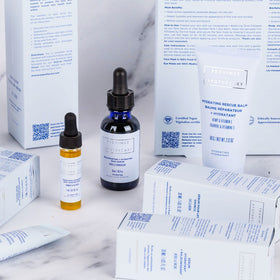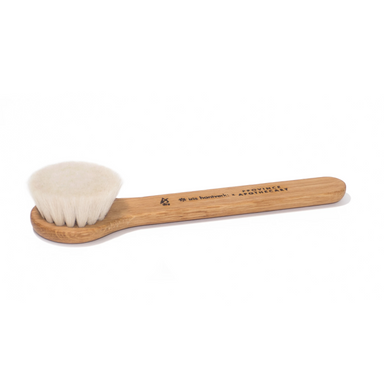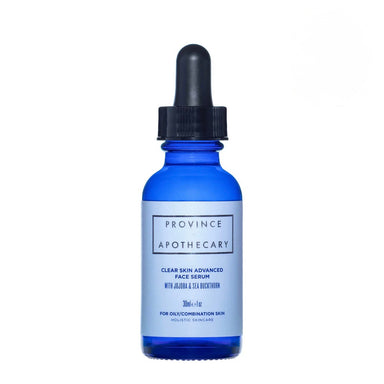How to Care for Your Chest: Common Concerns and Natural Solutions

Summertime is synonymous with bathing suits, tank tops, dresses, halter tops and other clothing that shows more skin than any other season. This is a source of great anxiety for those who struggle with chest acne. In today’s blog, we will go through common causes of chest acne, holistic solutions and a few things you can do on a routine basis to prevent chest acne. This blog is part of a series of blogs that focus on different parts of the body. Last month we covered the neck; take some time to read that one as well, since there are a few crossovers.
Before we get started, it is important to note here that you might be dealing with an isolated cause but it could also be a combination of these causes.
Cleansing and Moisturizing
You may be seeing mild acne on your chest due to clogged pores. We tend to focus on our faces more than any other part of the body. It is possible that pollution, dirt and sweat from your day are clogging your pores which results in blemishes. We recommend that you include the chest into your cleansing routine. Be gentle! Do not use extremely hot water. This is important because the skin on your chest is fragile. Use a gentle cleanser and remove with a wet face cloth. You can also gently exfoliate 1-2 times a week.
Make sure that the products you are using are compatible with your skin. The skin on your chest, much like your neck, is thinner and has fewer oil glands than the skin on your face. The oil production may fluctuate as we experience changes in our hormones. Your products should work with your skin type; what you are using should balance your skin and also nourish it.
To take your facial skincare routine down to your chest, we recommend:
- Cleansing with our Moisturizing Cleanser + Makeup Remover, using a soft washcloth to remove
- Mix Regenerating + Stimulating Exfoliator with enough water to make a paste and massage very gently into the chest. Remove with a washcloth (or in the shower)
- Spritz your chest with our Invigorating + Balancing Toner
- Gently massage a few drops of oil serum, like our Clear Skin Advanced Face Serum, mixed with a few drops of toner (or water) onto your chest
A note on coconut oil: certain skin types can take to coconut oil but for the most part, coconut oil is too heavy for many skin types. If you are using coconut oil consistently on this area, it may be clogging your pores as well.
Sun Exposure
Unmediated sun exposure could be causing breakouts on your chest. As mentioned, the skin on your chest is quite thin and has fewer oil glands. This already makes your chest more susceptible to dryness. With overexposure to the sun, the oil glands go into overdrive and start to produce too much oil and sebum to compensate for the loss of moisture. This leads to overall imbalance in the skin and to clogged pores and acne. If you tend to spend lots of time in the sun, be sure to wear a good reef-safe mineral SPF, and reapply when necessary. Take shade breaks and bring a cover up; SPF can only protect you so far! If you are wearing sunscreen, be sure to thoroughly cleanse it off your skin every night.
Synthetic Fragrance in Soaps and Perfumes
Synthetic fragrances are present in almost all drugstore soaps, moisturizers, shower gels and perfumes. A synthetic scent is formulated in a lab from petroleum and petroleum by-products. You may know of petroleum because it is also used to make gasoline and diesel oil. Synthetic fragrances are extremely harsh on our skin when applied topically and are harmful to our overall health. They may disrupt your hormones, put extra stress on your nervous system, and cause inflammation– all of these symptoms may lead to breakouts on your chest and other parts of your body. Stay away from these types of products, and be suspicious of products that claim to have no scent. A good rule of thumb is to stay away from anything with ingredients you can’t pronounce. We love this handy, free Pocket Guide from Beauty Heroes for which ingredients to look for and which to avoid.
Diet
Breakouts on your chest may be indicative of inflammation caused by diet. Some common dietary aggravators that you may be reacting to are dairy products (milk, sour cream, cheese), gluten products (bread, and pastries), nightshade vegetables (tomatoes, eggplant), refined sugar, and alcohol. We recommend doing an elimination diet to determine the culprits. Cut out one group of inflammatory foods at a time and see what changes you observe in three weeks. Keep a daily log of what you are eating, how you feel and what your skin is doing. One more thing to consider is your protein powder if that is something you take regularly. A lot of those supplements contain protein blends with whey and casein which are derived from milk products. For some people the ingestion of these types of protein blends may result in an imbalance of hormones that can lead to more painful cystic acne. We suggest trying a vegan protein powder alternative.
Everyday Tips for Chest Care
There are a few consistent things that you can do everyday to take care of your skin as a whole, which will also help with isolated problem areas. Your skin is dynamic with different parts varying in sensitivity and needs but it is a single organ. Think of your skin as a big network: any isolated outbreaks you might be having are indicative of the state of the whole system so it’s important to consider a holistic approach to healing.
For overall skin health, taking care of your lymphatic system is essential. The lymphatic system helps the body get rid of toxins You can maintain the function of your lymphatic system by dry brushing your body daily before a shower or a bath. We recommend using a very gentle dry brush, like the Daily Glow Facial Dry Brush is the perfect tool for this. Avoid using a coarse dry brush. Dry brushing helps loosen dead skin cells that may clog pores that is why it’s important to dry brush before taking a shower.
We also suggest taking epsom salt baths. You can do this daily. Epsom salts help detoxify your body. You can boost the detoxification process by adding 5-10 drops of our CSA Spot Treatment which will help with inflammation and will draw out bacteria from the skin.
Another benefit of epsom salt baths is the calming effect it will have on your nervous system. De-stressing from your day is really important for you overall health and it will have a positive effect on your skin.
____________________________________
YOU MAY ALSO LIKE...
ADULT ONSET ACNE | WHY IT HAPPENS AND WHAT WE CAN DO ABOUT IT






